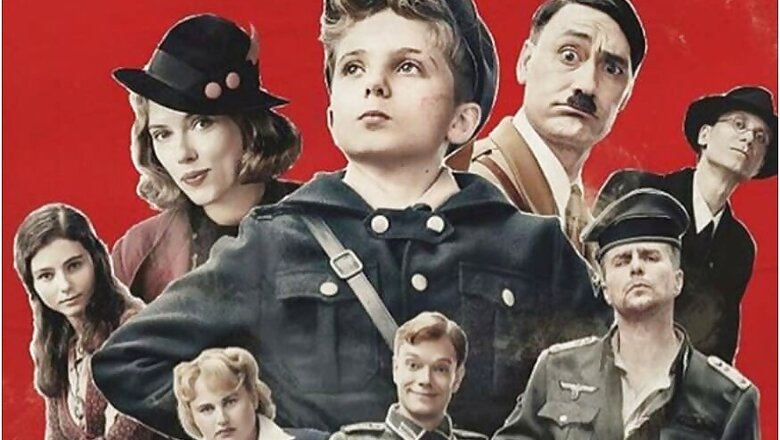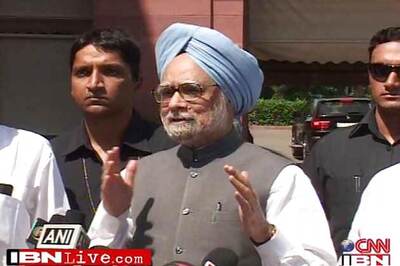
views
Taika Waititi’s film Jojo Rabbit is up for the Oscars honour in several categories and can only be likened to a dark, dark fairy tale. Or Life Is Beautiful in reverse.
Adapted from the novel Caging Skies by Christine Leunens, Jojo Rabbit transports us back to a time when Germany in general and the 10 year-old Jojo Betzler (Roman Griffin Davis) in particular are enamoured of Adolf Hitler, The Fuhrer. Following his idol’s diktat with all the sincerity that a little boy can muster up, Jojo has taken it upon himself to be the best Nazi ever.
In a departure from the novel, the screenplay adding a clever touch creates an imaginary Adolf Hitler as a friend to Jojo, akin to what Hobbes the tiger is to the young Calvin. What appears to be a Wes-Andersoneque movie in appearance with absurdist humour and colour saturated production design thrown in, the film aims to grapple with the devious nature of Fascism through a child’s confused understanding of it. Waititi in his many interviews has suggested that while researching the war in Bosnia, he came across stories about experiences of children in strife-torn regions and it made him almost certain that he wanted to tell the story of the World War, the Holocaust and its chief architect through a child’s eye.
It is probably good that Hollywood keeps pulling Hitler and Nazis out of its attic every few years. The scourge of fascism unleashed by the unchecked Nazis is a potent reminder to humanity at large of the dangers it poses if history were to repeat itself. With its childlike interpretation of the dark narrative of otherness, Jojo Rabbit hits a raw nerve. The film's awareness of itself and the politics it ridicules is well placed. Many telling scenes in the film have demonizing descriptions of Jews that may seem humorous on the surface, but they actually showcase the process of fascist ‘othering’ that seeks to instill radical beliefs so deep that the believers can no longer tell the difference between myth and reality.
Under these unusual circumstances, young Jojo makes a startling discovery when he comes upon a Jew girl Elsa (Thomasin McKenzie) hidden in his home by his own mother. Unlike what he has been told about Jews, Elsa has no horns, doesn’t hang upside down like bats or the ability to read minds. He is almost disappointed that Jews are just humans like him and his parents whom he loves. Several moments in this caramelized confection of an absurdist drama cut close to the bone, reminiscent of present times when humiliation and false propaganda of both individuals and communities have acquired the status of a legitimised gladiator sport with frenzied mobs of trolls baying for blood. The film is both an oddly charming and chilling reminder that when societies swing dramatically towards extreme muscularity in politics dismissing compassion as a sign of weakness, it is time to rethink and reboot.
The recent example of Shaheen Bagh and attempts to link the protests being staged there by women, to terrorists and anti-nationalism appears to be exactly what the film seems to be warning us against. As self-serving propaganda keeps rewriting facts—a question about Mahatma Gandhi committing suicide in a recent school exam being an example—the dangers of a highly polarized society cannot be overemphasized and Jojo Rabbit does that with a powerful sweep.
In a particularly poignant scene Scarlett Johansson who plays Jojo’s mother Rosie tries to playfully nudge him away from a political standoff, pointing out that he is just a 10-year-old boy meant to climb trees and not go to war or worry about politics. It is this tenderness and love or a few humane moments that bring in hope in the world of Jojo Rabbit otherwise locked in the vice grip of cold hatred.
“Your mother is kind. She treats me as a person,” says Elsa to Jojo during their furtive exchanges. It is evident in each scene that the boy struggles against his own natural friendliness to cast himself in the inhuman political mould created by Hitler and his oppressive worldview. The dastardly outcome of such thinking only dawns on him much later with his own personal loss. It dawns on young Jojo that the only remedy for the colossal human tragedy caused by The Fuhrer, is love as prescribed by his mother.
Jojo Rabbit should be a mandatory watch for everyone, the world over; if not to transform, to at least glance at the crystal ball at what lies ahead if hatred for the other so vociferously being encouraged in political discourse is allowed to reach its natural conclusion. Will we, like Jojo Rabbit, get so polarised and segregated that our children start imagining horns growing on ‘the others’ heads? Or are we there already?
Follow @News18Movies for more


















Comments
0 comment